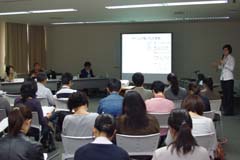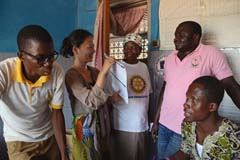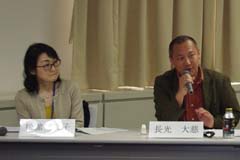JOCVs' Networks and Trust Building' Presented at the 7th JOCV Research Seminar
2016.05.16
The JICA Research Institute holds seminars to present the results of the project "An Interdisciplinary Study of Japan Overseas Cooperation Volunteers," which analyzes JOCV projects from various academic viewpoints. The seventh seminar was held April 24, 2016, focusing on the characters of the volunteers. The event took place as a part of JOCV’s annual homecoming event.
After an opening address by JICA-RI Director Naohiro Kitano, JICA-RI Visiting Fellow Yasunobu Okabe (a professor at Tohoku University), a lead researcher of this project, and Research Fellow Mayuko Onuki gave presentations based on poll data. Okabe spoke about "Six Types of JOCVs — Classifying by Motive for Applying" and "JOCVs' Networks and Trust Building." Onuki talked about "JOCVs and fundamental work competencies as productive members of their communities." Daiji Nagamitsu, a former JOCV and the head of the NPO Kaihatsu Media ganas and Fumiko Matsudate, also a former JOCV now a JICA staff member with the Secretariat of JICA's Japan Overseas Cooperation Volunteers, served as discussants, using their own experiences.

JICA-RI Research Fellow Mayuko Onuki gives a presentation
Okabe’s presentation, JOCVs' Networks and Trust Building, was an attempt at applying the concept of social capital to analyze data from polls of the opinions of JOCVs.
In Okabe's investigation, he designated the number of newly developed close friends (including Japanese) and the number of times they participated in events usually closed for community members, such as family ceremonies, as the "network" index. He also designated the degree of trust toward people living in the same neighborhood in one's dispatch destination and toward colleagues at their work, as well as whether a person has experienced the feeling of having fit in with the local community during her tenure, as the "trust" index.
He found that newly formed close friendships averaged 5.5 and JOCVs participated in an average of 3.84 important family ceremonial and other events. The score for degree of trust toward neighbors and co-workers averaged 2.76 on a scale of 1 to 4. A score of 2.0 or higher indicates that a person is trusted. Also, 88 percent of JOCVs experienced a sense of fitting in with the community during their service. Okabe summarized the implications as follows: "JOCVs are forming networks and trust, in other words social capital, in their assigned communities."

A Japan Overseas Cooperation Volunteer works with her colleagues in Ghana (Photo: JICA/Takeshi Kuno)
Okabe also conducted comparative research by region and found the following: 1. There were no big differences in the number of close friends, but there were relatively fewer on Pacific Islands. 2. There was a regional difference in the number of times events took place, with Asia having the most, followed by the Pacific Islands, and then Africa-Mideast, and with Latin America having the fewest. 3. There were not many regional differences in the degree of trust toward local people. He concluded that comparatively more JOCVs did not experience the feeling of fitting in with the community in Africa-Mideast and the Pacific Islands.

Fumiko Matsudate, a JICA staff member (left) and Daiji Nagamitsu, the head of the NPO Kaihatsu Media ganas
A discussant, Nagamitsu, talked about his personal experience as a JOCV with a mission of carrying out environmental education. However, because he did not see much proactivity in the place he was assigned to, he took such actions as starting a free newspaper and talking to people about Japan, and eventually began getting a reaction from places outside his assigned office. Regarding this comment, Okabe explained that this voluntary behavior and the response to it exemplifies "the creation of dynamic information," in other words, formation of a network. Also, he argued that participants in networks of volunteer activity have the characteristic of "flexible specialization," in which one's role changes to respond the situation and conditions, rather than having a fixed role.
Matsudate said that while she had never thought about advancing her career as a motivation for applying to the JOCV, JOCV actually improves human abilities and risk avoidance skills, which is a core competency that private sectors also want.
There were questions from the audience on differences in JOCVs’ motivations due to areas of their activities and whether there were surveys conducted after JOCVs had returned home and some time had passed. Okabe answered that no consistent tendencies based on occupation were evident in his analyses. Onuki supplemented that degrees of volunteer goal achievement based on the self-report survey were higher in the area of education, such as those by Japanese language teachers and math and science teachers, than in the area of community development. Furthermore, there was a report that no follow-up survey has been yet conducted in order to trace JOCVs after they returned home in this program of research; however, researchers are discussing the importance of such surveys.

事業事前評価表(地球規模課題対応国際科学技術協力(SATREPS)).国際協力機構 地球環境部 . 防災第一チーム. 1.案件名.国 名: フィリピン共和国.

事業事前評価表(地球規模課題対応国際科学技術協力(SATREPS)).国際協力機構 地球環境部 . 防災第一チーム. 1.案件名.国 名: フィリピン共和国.

事業事前評価表(地球規模課題対応国際科学技術協力(SATREPS)).国際協力機構 地球環境部 . 防災第一チーム. 1.案件名.国 名: フィリピン共和国.

事業事前評価表(地球規模課題対応国際科学技術協力(SATREPS)).国際協力機構 地球環境部 . 防災第一チーム. 1.案件名.国 名: フィリピン共和国.

事業事前評価表(地球規模課題対応国際科学技術協力(SATREPS)).国際協力機構 地球環境部 . 防災第一チーム. 1.案件名.国 名: フィリピン共和国.
scroll